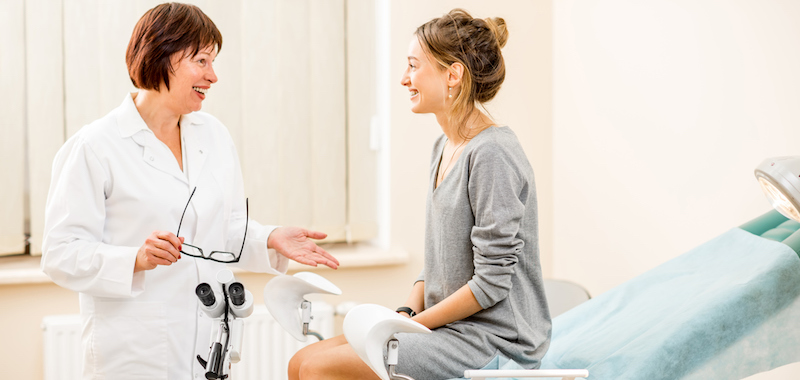Going to the gynecologist is hardly anyone’s favorite activity. You have to step on a scale and hear how much you weigh. You have to fully undress in a cold room with fluorescent lights.
You have to sit there, naked, save for a thin paper robe, then lay down and spread your knees apart so that a doctor can inspect your vagina; all while pretending that this is how you normally talk about how it’s going at work and about your trip to the Florida Keys for your best friend’s bachelorette party.
Speaking of that party… would you be able to get tested for STDs from a regular annual pap test, or would you have to actually bring it up to your doctor?
What’s involved in a routine gynecological exam?
A routine gynecological exam (also called a pelvic test) involves your doctor inserting two gloved, lubricated fingers into your vagina and palpating your lower abdomen with the other hand. This is done to detect any tenderness, pain, or bumps.
The doctor will then visually inspect your vagina for any redness, swelling, or irritation.
In addition, the doctor will insert a speculum into your cervix (the lower part of your uterus). The speculum opens the vaginal walls for a better visual examination.
During a regular pelvic exam, your doctor will likely swab your cervix to collect a sample of your cells. This is called a pap test, and it is done to screen for cervical cancer.
If you’ve never been to a gynecologist, rest assured, this process sounds a lot scarier and intimidating than it actually is. Most of the discomfort comes from the lubricant or speculum being cold. Other than that, the test is relatively painless and it only takes a couple of minutes.
For Gynecological Care
Call (941) 907-3008 or Schedule An Appointment Here
Can a pap smear detect STDs?
Pap tests would detect the presence of human papillomavirus (HPV). HPV is the most common sexually transmitted disease, so technically speaking, pap smears do test for an STD.
HPV is peculiar in the sense that while it could pose health complications, such as genital warts and cervical cancer, it could also go away on its own. If you do have it, you should follow your doctor’s instructions regarding monitoring and medication.
If you don’t have it, you could get vaccinated against it.
Other than HPV, a regular pap test or pelvic exam won’t screen for other sexually transmitted diseases, such as:
- Herpes
- Syphilis
- Chlamydia
- Gonorrhea
- Hepatitis
- Trichomoniasis
- HIV
If you have any sores, your doctor will notice them and likely recommend additional testing for sexually transmitted diseases. But there are plenty of people with STDs who don’t have any symptoms. And unless you have genital warts or a sore outbreak, your gynecologist won’t know from a pelvic exam or a pap test that you have an STD.
This means that if you think you may have been exposed to a sexually transmitted disease, you’ll have to ask for a screening.
Why You Should Get Tested for STDs
If you’ve ever had unprotected sex, you may have been exposed to a sexually transmitted disease. This means vaginal, anal, and oral sex. You could get infected from either one.
In fact, half of the population in the United States will have acquired an STD by age 25. This means that (a) everyone should pay attention to their sexual health and (b) gynecologists have already seen everything.
There’s nothing you can tell us or show us that will either scandalize us or make us judge you. We are here to help you and provide you with as much information as possible so that you can get the treatment you need.
Most Common STD Symptoms
While some sexually transmitted diseases don’t have any symptoms, others do show signs of infection, such as:
- Unusual vaginal discharge (gray, green, or yellow)
- Foul smelling vaginal discharge
- Pain while urinating
- Sores (in vagina, mouth, or anus)
- Fever
- Lower abdominal pain
- Pain during sexual intercourse
- Bleeding between periods
- Genital itching
Risk Factors for Contracting STDs
As previously mentioned, anyone who’s ever been sexually active could potentially contract a sexually transmitted disease. However, there are certain factors that would significantly increase a person’s likelihood of getting infected. Some of them are the following:
- Having unprotected sex (vaginal, oral, or anal)
- Having multiple sex partners
- Injecting drugs
- Drinking so much alcohol, you’ve passed out or not remembered what happened
- Sexual assault
Contact us at OB-GYN Women’s Center for STD Testing
At OB-GYN, we aim to establish trusting relationships with our patients. If you believe you may have a sexually transmitted disease, don’t be afraid to ask for testing. We want to help you.
Contact us to schedule an appointment. We’ll answer all of your questions and strive to procure the best treatment for your sexual health.




